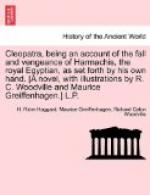“Yes, it is nothing; I also have slept—I feared to waken thee if I stirred.”
“Go, rest,” I said; “it shames me to think of this thing. Go rest thee, Charmion!”
“Vex not thyself,” she answered; “see, I will bid a slave watch thee, and to wake me if thou needest aught; I sleep there, in the outer chamber. Peace—I go!” and she strove to rise, but, so cramped was she, fell straightway on the floor.
I can scarcely tell the sense of shame that filled me when I saw her fall. Alas! I could not stir to help her.
“It is naught,” she said; “move not, I did but catch my foot. There!” and she rose, again to fall—“a pest upon my awkwardness! Why—I must be sleeping. ’Tis well now. I’ll send the slave;” and she staggered thence like one overcome with wine.
And after that, I slept once more, for I was very weak. When I woke it was afternoon, and I craved for food, which Charmion brought me.
I ate. “Then I die not,” I said.
“Nay,” she answered, with a toss of her head, “thou wilt live. In truth, I did waste my pity on thee.”
“And thy pity saved my life,” I said wearily, for now I remembered.
“It is nothing,” she answered carelessly. “After all, thou art my cousin; also, I love nursing—it is a woman’s trade. Like enough I had done as much for any slave. Now, too, that the danger is past, I leave thee.”
“Thou hadst done better to let me die, Charmion,” I said after a while, “for life to me can now be only one long shame. Tell me, then, when sails Cleopatra for Cilicia?”
“She sails in twenty days, and with such pomp and glory as Egypt has never seen. Of a truth, I cannot guess where she has found the means to gather in this store of splendour, as a husbandman gathers his golden harvest.”
But I, knowing whence the wealth came, groaned in bitterness of spirit, and made no answer.
“Goest thou also, Charmion?” I asked presently.
“Ay, I and all the Court. Thou, too—thou goest.”
“I go? Nay, why is this?”
“Because thou art Cleopatra’s slave, and must march in gilded chains behind her chariot; because she fears to leave thee here in Khem; because it is her will, and there is an end.”
“Charmion, can I not escape?”
“Escape, thou poor sick man? Nay, how canst thou escape? Even now thou art most strictly guarded. And if thou didst escape, whither wouldst thou fly? There’s not an honest man in Egypt but would spit on thee in scorn!”
Once more I groaned in spirit, and, being so very weak, I felt the tears roll adown my cheek.
“Weep not!” she said hastily, and turning her face aside. “Be a man, and brave these troubles out. Thou hast sown, now must thou reap; but after harvest the waters rise and wash away the rotting roots, and then seed-time comes again. Perchance, yonder in Cilicia, a way may be found, when once more thou art strong, by which thou mayst fly—if in truth thou canst bear thy life apart from Cleopatra’s smile; then in some far land must thou dwell till these things are forgotten. And now my task is done, so fare thee well! At times I will come to visit thee and see that thou needest nothing.”




